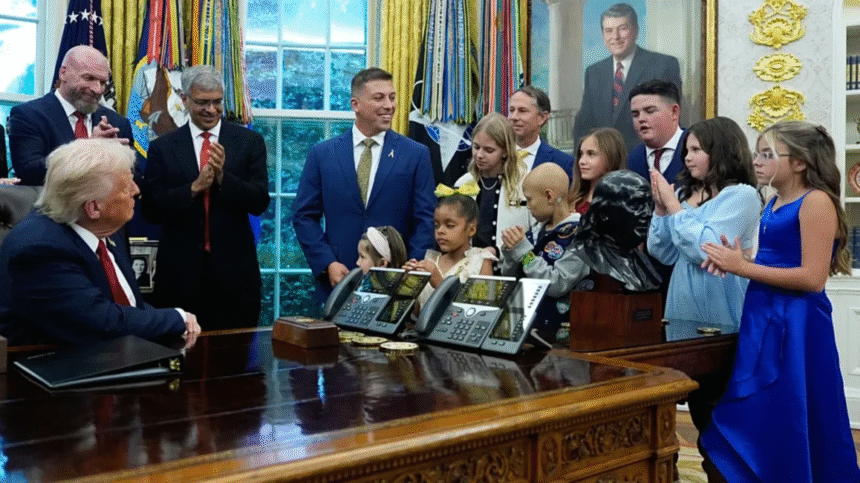President Donald Trump has announced a new executive order aimed at leveraging artificial intelligence (AI) to accelerate progress in the fight against pediatric cancer.
The order pledges $50 million (€43 million) in new funding for a childhood cancer data initiative, first launched during Trump’s initial term in office.
Officials say the funding will support the collection and analysis of large medical datasets, using AI to improve diagnoses, accelerate clinical trials, and strengthen preventive efforts.
“We are going to connect artificial intelligence with everything else we have available,” Trump said in the Oval Office on Tuesday. “And we will come up with answers, and these little children, some are absolutely much better, and others are improving.”
Addressing young cancer survivors gathered around the Resolute Desk, Trump added: “You all will be much better very soon.”
White House officials declined to specify which companies or technologies might be involved, saying details are still under development. However, Trump suggested the technology would eventually be widely accessible: “It will be very attainable for everyone.”
Pediatric Cancer: Rare but Devastating
Although relatively rare, cancer is the leading cause of disease-related deaths among children in the United States beyond infancy.
The American Cancer Society estimates that approximately 9,550 children in the U.S. will be diagnosed with cancer in 2025.
While survival rates have improved significantly—with childhood cancer mortality falling by more than 50% since 1975—incidence rates have steadily increased since the 1970s.
Globally, cancer affects around 400,000 children and adolescents under 19 each year, according to the World Health Organization (WHO).
Research on pediatric cancer remains chronically underfunded, representing less than 10% of the federal cancer research budget, according to the Children’s Cancer Foundation.
Doubling the Commitment Amid Broader Funding Cuts
Trump’s executive order doubles the National Institutes of Health’s commitment to the Childhood Cancer Data Initiative, raising total funding to $100 million. However, this comes against a backdrop of broader federal science funding cuts under his administration.
In recent years, hundreds of scientists have been removed from federal payrolls, and several hundred million dollars in grants—including some supporting pediatric cancer research—have been canceled.
The Pediatric Brain Tumor Consortium, a national network providing children access to experimental treatments for more than 25 years, was notified in August that it would no longer receive federal support.
Previous budget proposals also suggested cutting the National Cancer Institute’s funding by more than one-third, though those reductions remain under negotiation.
The American Cancer Society’s Cancer Action Network has warned that the proposed cuts “would dramatically set back this country’s ability to reduce deaths and suffering.”







